| Article ID | Journal | Published Year | Pages | File Type |
|---|---|---|---|---|
| 1427832 | Materials Science and Engineering: C | 2016 | 8 Pages |
Abstract
An effective chemical approach to modulation of biological interactions of cationic polymers was proposed and tested using polyethyleneimine (PEI) as a drug carrier. Branched 25Â kDa PEI was modified in the reaction with propylene oxide (PO) to produce a series of propoxylated PEIs with NH groups grafted by single or oligomer PO units. Clear relationships between the propoxylation degree and biological effects, such as interaction with plasmid DNA, hemolytic, cytotoxic, and pro-apoptotic activities were revealed for PEIs modified upon PO/NH molar ratio of 0.5, 0.75, 1.0 and 3.0. The partial modification of available cationic centers up to 100% is predominantly accompanied by a significant gradual reduction in polycation adverse effects, while ability of complex formation with plasmid DNA is being preserved. Grafted PEI with 0.75 PO/NH ratio provides better protection from nuclease degradation and transfection activity compared with other modified PEIs. Revealed relationships contribute to the development of safe polymeric systems with controllable physicochemical properties and biological interactions.
Related Topics
Physical Sciences and Engineering
Materials Science
Biomaterials
Authors
Vesta D. Shevchenko, Diana V. Salakhieva, Abdulla A. Yergeshov, Yuriy V. Badeev, Yurii G. Shtyrlin, Timur I. Abdullin,
